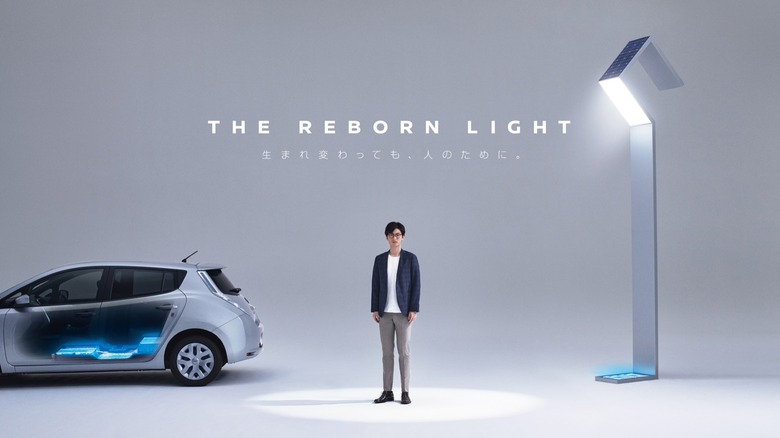Nissan's Reborn Light Gives Old EV Batteries A Streetlamp Job
Nissan plans to put old electric car batteries to work again, giving them a second life in off-the-grid solar powered street lamps. The project, dubbed The Reborn Light, aims to give EV components another stab at usefulness, after they're no longer up to the job in transportation.
It's not an insignificant problem, either. Electric vehicles – whether pure-electric or hybrid – may still make up a relatively small percentage of overall car sales, but they're already voracious consumers of batteries. The voltage demands of EVs, though, mean an older battery no longer packing sufficient grunt for meaningful range on the road might still have more than enough capacity for storage intended for other purposes.
That's just what Nissan and its affiliate 4R Energy Corporation have in mind. They'll be installing new street lighting in Namie, a Japanese town heavily affected by both the 2011 Tohoku earthquake and the Fukushima Daiichi nuclear disaster. By using solar panels and LEDs, the custom lamps will be completely independent from the traditional main power grid, and require no electric cables or outlets.

The design resembles a stylized shepherd's crook, with the solar panel on the upper section and a sheet of LED lights underneath. In the base, battery packs repurposed from old electric cars like the Nissan Leaf store the electricity generated from the sun during the day, and then release it to power the lights at night. The lamps stand just over nine feet high.
Nissan and 4R Energy Corporation plan to test the first prototype streetlamp later this month, at a battery reclamation factory also located in Namie. Assuming all goes to plan, the full scale installation is expected to begin sometime in the 2018 financial year. However, it's not the end of Nissan's ambitions for repurposing old batteries.
Future designs, the company suggests, could also be used as independent power stations. Effectively, the old car batteries would be combined to make off-grid power storage units. These could be tapped into during emergencies, for example, or used to provide a source of power for charging smartphones and other small devices in remote locations or even on mobile carts.
It needn't even use solar power, Nissan points out. Another idea the automaker has is to integrate the batteries into a children's park, converting energy from the kids movements on slides, swings, and other equipment into electricity that would be stored in the car batteries. That could then be used to light the whole park at night.
Nissan isn't the only company thinking of ways to potentially reuse EV battery packs, mind. Back in 2016, BMW revealed plans to park old batteries for home energy storage; the year prior, GM showed something similar for powering office buildings. Last year, BMW opened a battery farm in Germany, using new and old BMW i3 batteries to store energy from wind turbines and use it, ironically, to help power the plant that actually makes the car.
